Search Results for Tag: Climate Change College
Empowering Arctic Youth
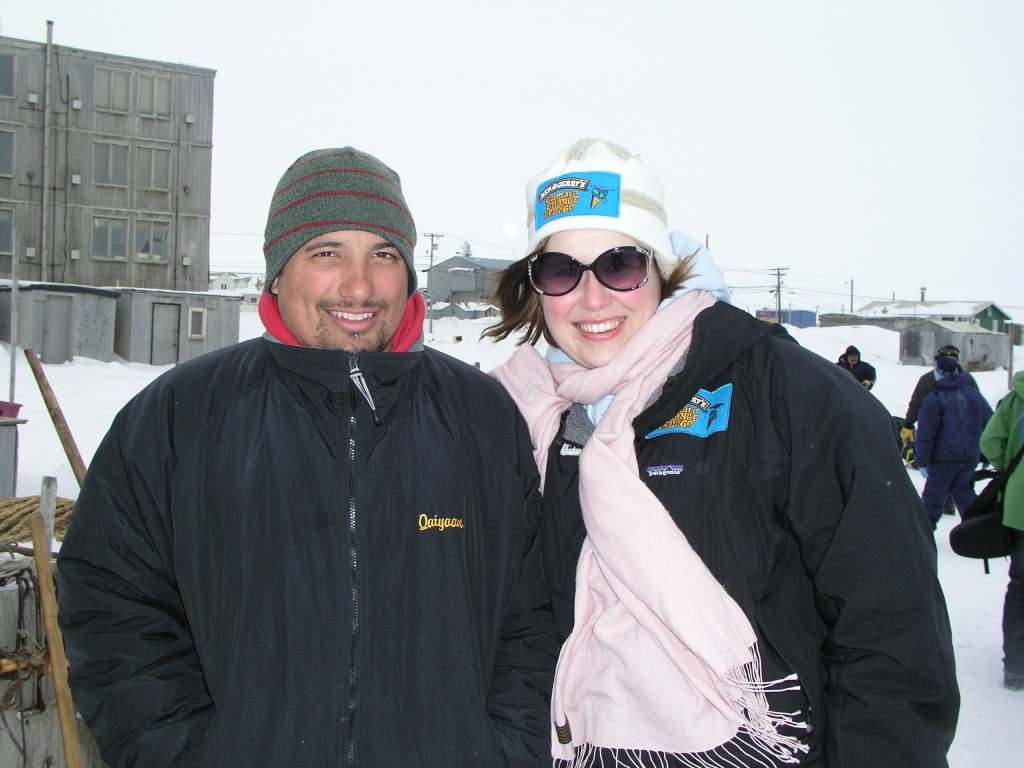
Cara and Kayan – “Give me a solar-powered snow mobile and I’ll use it” was the young Eskimo’s quip in Barrow, Alaska, in 2008.
Back in 2008, the Ice Blog was born when I was on a trip to Alaska reporting on the “Climate Change College”, a joint project by WWF and an ice cream company to interest young people in climate change. Young climate ambassadors from Europe had won a trip to Arctic Alaska to find out first hand about the impacts of climate change – and to meet with young people in the region. I am still in contact with some of the ex-ambassadors, who are continuing to make contributions to climate and environment protection in their careers and everyday lives. Cara Augustenborg in this photo is a successful academic, entrepreneur and Green Party candidate in Ireland. Kayan, I wonder if you are still in Alaska and if you ever got yourself an environment-friendly means of transport?
Anyway, I have Elías Thórsson from the Arctic Journal to thank for drawing my attention to a new youth project inside the Arctic: YAC, the Youth Arctic Coalition. It sees itself as “Youth collaboration to address environmental, economic and social challenges and opportunities in the Arctic”. The latest edition of the Arctic Journal has a story by Elías on the group and the need to include young people in decisions on Arctic issues, headlined “Carpe Arcticum”.
Indeed, the Arctic is one of the fastest changing places on the planet. With countries as far away as China or Japan making their interest(s) plain, what happens in the Arctic today will have a huge impact to the region future generations in the High North will inherit.
During my latest visit to Arctic Norway in January, young protesters in Tromso told me of their fears about the environmental impacts of Arctic oil drilling. During visits to Alaska, I spoke to young Inupiat residents who were more concerned about jobs and hoping to continue to benefit from wealth from the oil industry. In Greenland, some of the youngsters I spoke to were torn between concern about the melting ice and changes to the lifestyle they had grown up with, and the hope that climate change might bring jobs and prosperity to their Arctic island.
The YAC, which held its inaugural conference in February, is trying to bring young people from across the Arctic together to have their say in what is happening. It is not an easy task, as Elías explains in the article. Clearly, views amongst young people will cover as wide a spectrum as those of any other generation. But they will be united in their interest in looking beyond the short-term interests which influence business and politics today.
So good luck to YAC and here’s hoping your organization will attract a lot of interest. And that it will inspire a lot of active participation to shape a sustainable future for the Arctic and represent the interests of coming generations in a region in danger of losing its identity amidst the ever-faster changes caused by a warming climate.
Climate change back on the agenda?
Trawling the media for climate-related stories over the weekend, I began to see some signs that the message might be getting across after all. I had just put the finishing touches to my story on “Why we don’t want to hear about climate change“, based on interviews with sociologist Kari Marie Norgaard from the University of Oregon and psychologist Per Stoknes from the Norwegian Business school, when I heard US Secretary of State John Kerry’s announcement that the USA and China would be cooperating and exchanging data in the run-up to the 2015 Paris climate talks, where a new climate deal is supposed to be agreed. I found myself feeling just a little bit more optimistic. If these two key players really put climate protection into action, maybe we will be able to get somewhere. A report on a study by the Chinese government on the disastrous air pollution in Beijing is not happy reading, but gives grounds to assume the Chinese government has to be serious about taking emissions in hand.
Arctic ambassador – a sign of the times?
Another announcement by the US Sec of State leaves me with mixed feelings. There is going to be a US ambassador for the Arctic. On the one hand, it is always good to see the Arctic getting attention. On the other hand, the motivation does not make me jump for joy. An item from the news agency AFP writes of “a region increasingly coveted by several countries for its oil and other raw materials”. Indeed. That is the worrying bit. In case you missed it, (the Arctic announcement did not get huge coverage), Kerry said in his statement:
“The Arctic region is the last global frontier and a region with enormous and growing geostrategic, economic, climate, environment and national security implications for the United States and the world…President Obama and I are committed to elevating our attention and effort to keep up with the opportunities and consequences presented by the Arctic’s rapid transformation – a very rare convergence of almost every national priority in the most rapidly-changing region on the face of the Earth”. It is good to see climate and environment get a mention at least.
A “Stern” warning
The Guardian had a guest article by Nicholas Stern, the author of that famous Stern Report on the economics of climate change back in 2006 (yes, it really is that long ago).The background to this, of course, is the wild weather in the UK. Now I do not wish that kind of weather on anyone, but in terms of drawing attention to climate change it has certainly been very important. Stern writes “The record rainfall and storm surges that have brought flooding across the UK are a clear sign that we are already experiencing the impacts of climate change”. He makes a clear case for linking the two. He also brings in the other extreme weather around the globe, including Australia, Argentina and Brazil and the devastating typhoon Haiyan in the Philippines last year. Stern has clear advice for the politicians:
“This is a pattern of global change that it would be very unwise to ignore.” Stern says the risks are even bigger than when he wrote the 2006 report. “Since then, annual greenhaouse gas emissions have increased steeply and some of the impacts, such as the decline of Arctic sea ice, have started to happen much more quickly.”
I hope a lot of decision-makers and influential business people have read or will still read Stern’s article. He calls for rapid action and investment. He has a clear message for the European Union, currently not the most popular international organisation with the British government. “The UK whould work with the rest of the EU to create a unified and much better functioning energy market and power grid structure. ‘this would also increase energy security, lower costs and reduce emissions. What better was is there to bring Europe together?” Other measures recommended would be to implement a “strong price on greenhouse gas pollution across the economy”. This, remember, is a renowned economist, not an environmental campaigner. He also warns against the temptation to cut overseas aid to fund adaptation to climate change. “It would be deeply immoral to penalise the 1.2 billion people around the world who libve in extreme poverty…In fact, the UK should be increasing aid to poor countries to help them develop economically in a climate that is becoming more hostile largely because of past emissions by rich countries”- Yes. Yes. Yes.
Don’t let the weather distract from your climate awareness!
The other piece of writing which inspired me over the weekend was in the ImaGeo blog by Tom Yulsman: “Move over polar vortex“. He looks at the new analysis produced by the UK’s Met Office:
“If a new scientific analysis is correct, the repeated bouts of extreme weather on either side of the Atlantic are indeed unusual – and both are manifestations of a chain of climatic teleconnections that reach half way around the globe and all the way to the tropics”.
There is a lot of talk in this piece of whether the polar vortex is weak (as discussed in my article More Arctic Weather in a Warming World?) Or actually “particularly intense”. I would recommend you read Tom’s blog for yourselves for the details and his views. But the insight I would leave you with here as “food for thought” is where he quotes a paper in the journal Science.
“They conclude that the recent discourse focusing on the possible connections between winter weather and climate change distracts from the bigger issue: that is, regardless of extreme winter weather, climate change is undoubtedly real, and that harsh winters are not what we really need to be concerned about going forward as the climate continues to change”.
People love to talk about the weather. But if we use every instance of unusual weather to question the overall trend of global warming, with all the complex effects that has on our climate, winds, oceans etc, we run the risk of losing a necessary sense of urgency when it comes to reducing emissions. I am reminded, as I often am, of a young climate ambassador from the Netherlands during a fact-finding trip to Alaska in 2008. As we stood at the Visitor’s Centre for a glacier which is now no longer visible from that spot because it has retreated so far, he said that just brought home to him how “everything is connected”. Our everyday lifestyle in the industrialised world is melting the Arctic ice – and that, in turn, is contributing to the changing climate patterns which can radically alter the planet.
“On Thin Ice” at Warsaw climate talks
Did you know it was the “Day of the Cryosphere” at the Warsaw climate talks COP 19 in Warsaw yesterday? If not, you might be forgiven. I haven’t seen it making the headlines in the mainstream media. That is a pity, given that what climate change is doing to our ice, snow and permafrost has repercussions for the whole planet.
![]() read more
read more
Climate Reality in Istanbul
GUEST BLOG:
As promised in the last blog posting, climate activist Cara Augustenborg has written up some impressions from her meeting with “Climate Reality Leaders” from around the globe in Istanbul. Thank you Cara! Over to you:
This week I had the honour of becoming a part of former U.S. vice president Al Gore’s global action on climate change, the Climate Reality Project. I now join over 5,000 other Climate Leaders from around the world in presenting the Climate Reality message, an updated version of Mr. Gore’s presentation from the 2006 movie, An Inconvenient Truth , to my community and anyone else who will listen.
Over 600 of us from 94 countries gathered in Taksim, Istanbul last weekend to receive training from Mr. Gore and the Climate Reality team and develop the necessary skills to bring a real understanding of the climate crisis to the world. It was a fitting location for so many environmental activists and educators to gather, given its proximity to the ongoing Occupy Gezi movement. As we equipped ourselves with the skills necessary to create action on climate change, Turkish protesters in nearby Gezi Park fought to win their own environment and democracy struggles. Many of us were caught in the middle of that struggle during the worst police clash last Saturday night. I’ll describe that frightening experience in an upcoming blog post on my own site.
Our Climate Reality training lasted 2.5 days and covered everything from communication skills, climate impacts, and social media, but of course the highlight of the weekend was the chance to spend ten hours in Al Gore’s presence soaking up every morsel of knowledge he could give us in that time. As Vice President of the United States, Mr. Gore was often referred to as wooden and robotic in his speaking style, but when it comes to climate-related issues, he is far from either and his style sometimes resembles that of a Baptist preacher when he gets really passionate about a topic. The audience could not get enough of Mr. Gore’s enthusiasm and motivational words, and at times, I was moved to tears as he inspired me to do more to win the conversation” on climate change.
The scale of The Climate Reality Project is impressive. In a 2006 Today Show interview, Al Gore said he aimed to teach 100 people to give his slideshow presentation and spread the word on climate change. Seven years later, he has trained over 5,000 of us to help our communities to understand the connection between over-reliance on fossil fuels and our changing climate. By the end of this summer, we will be nearly 6,000 strong. Given the financial resources of the climate change denial industry, the unique grassroots approach of the Climate Reality Project is embracing a philosophy that the number of people fighting for a cause will win over the number of euros invested in fighting against that cause. In our own group of 600+ delegates, we certainly felt more empowered to enact change now, with our new support of a worldwide climate change “family”, than we did before we arrived.
If you have seen “Inconvenient Truth”, you already know a lot of the background to Al Gore’s presentation, but there was lots of new information he presented over the weekend that surprised me, particularly regarding new evidence on the impacts of climate change and some exciting ways that countries (particularly developing countries) are both mitigating and adapting to climate change. I will be blogging about these issues on my own site over the coming weeks and thousands of us are available to present the new Climate Reality message in person by booking a presentation in your own area through the Climate Reality website
From Alaska to tear-gas in Istanbul
“Came for climate change training and just got tear gassed by Turkish police on walk home from dinner to hotel. SHAKEN BUT NOT STIRRED…” was the message I got from Cara Augustenborg in Istanbul at the weekend. Cara, whom I first met in Alaska when she was a “Climate Change College” ambassador, is now Ireland’s first “Climate Reality Leader”.
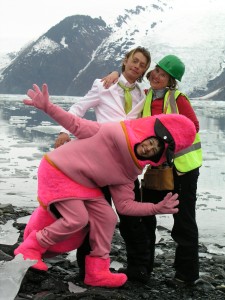
Cara, in the green hat, posing with fellow youth climate ambassadors Aart and Erika in Alaska, 2008. They were filming publicity stunts for their climate-saving projects.
She will be writing a guest blog here in the next couple of days. If you take a look at the Ice Blog banner, the lady with the beige hat in the kayak is Cara. I took the photo from the kayak behind during the trip to Alaska in 2008 when the Ice Blog was born. The expedition was to find out about the impacts of climate change on the Arctic, including a trip to the Arctic research station in Barrow, meetings with local people in the northernmost town in the USA and a visit to the receding Begich Boggs glaciers near Whittier.
I was thrilled when Cara told me recently she had been chosen a “Climate Reality Leader” and invited to a climate workshop with Al Gore in Istanbul. Expect more on that in her guest post for the Ice Blog very soon. As it turned out, she and her fellow “climate leaders” ended up bang in the middle of the pro-democracy protests.
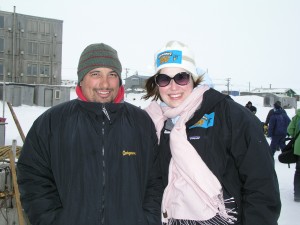
Cara and Kayan – “Give me a solar-powered snow mobile and I’ll use it” was the young Eskimo’s quip in Barrow, Alaska.
Cara is one of those committed people who live, work and think climate. She set up Ireland’s first website on “greening” your home, worked on biofuels at Dublin University and now successfully runs her own consultancy.
“Baked Alaska” – Picture gallery from the Climate Change College Expedition to Alaska



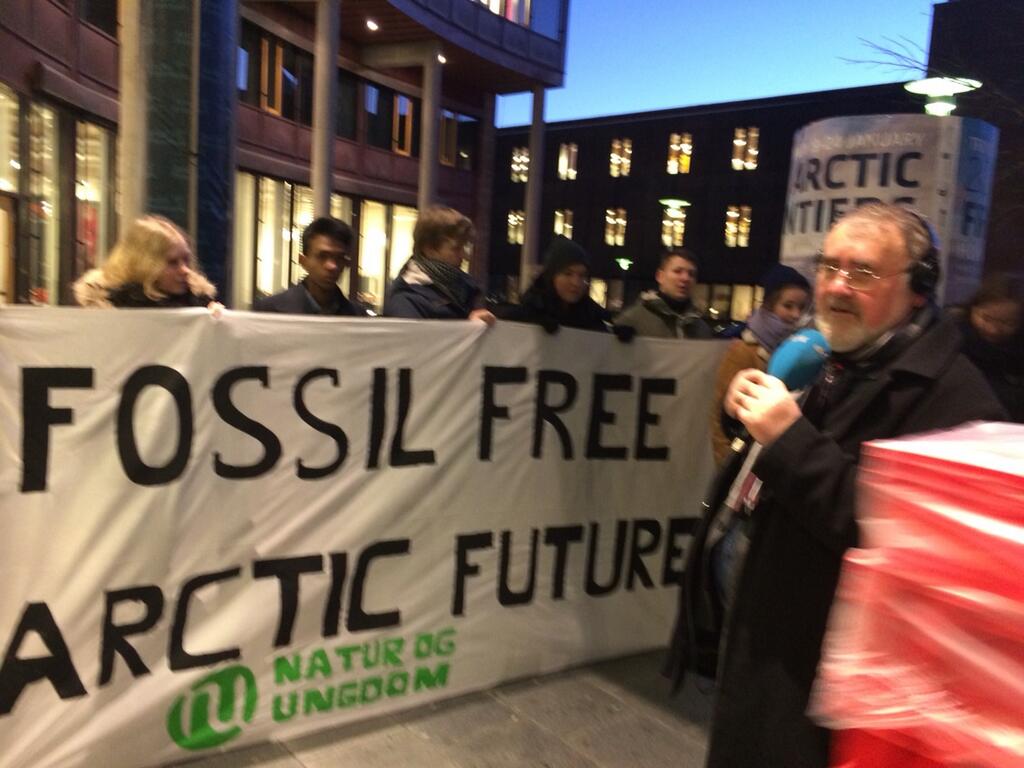

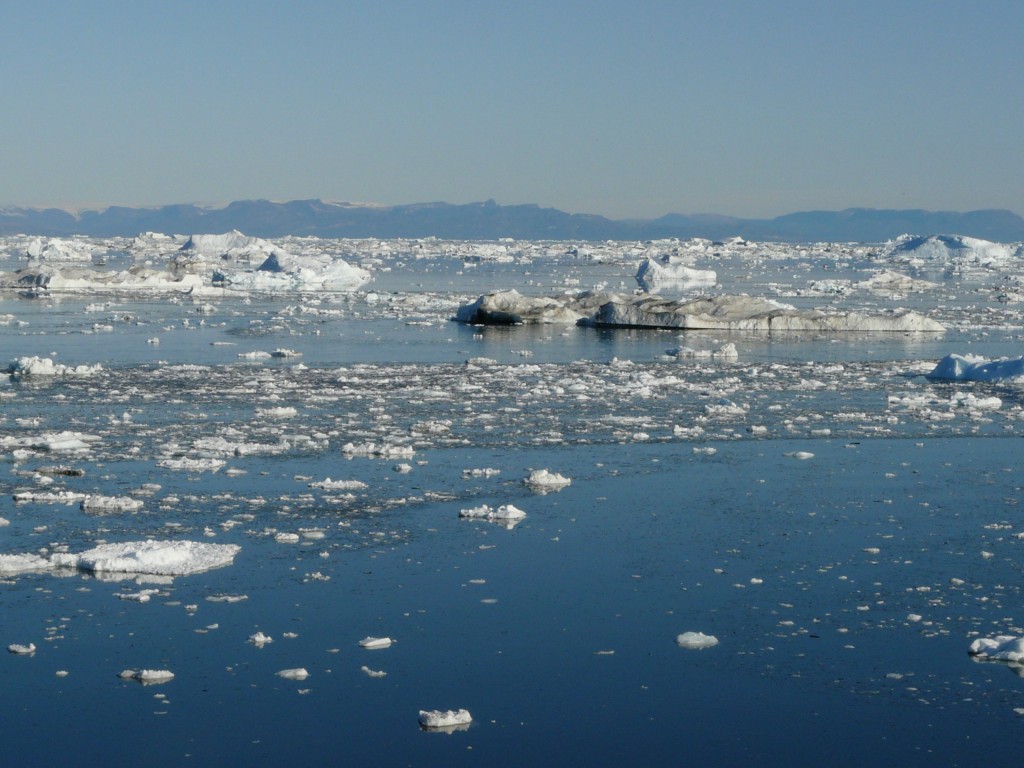
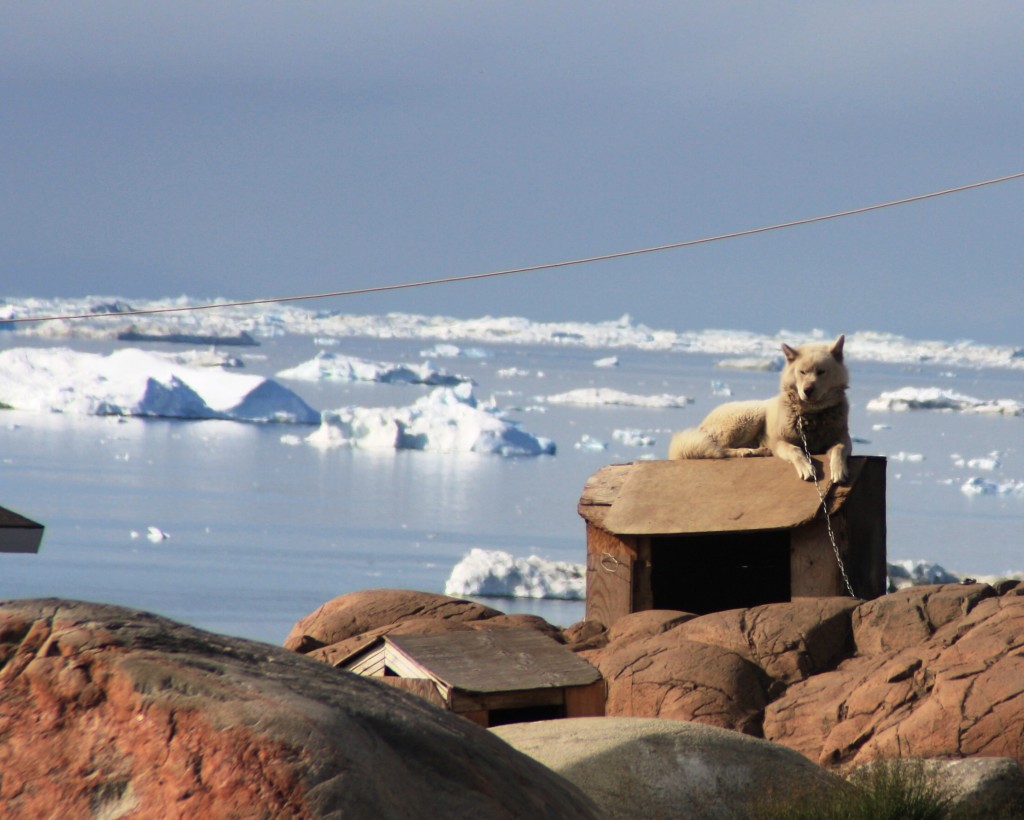
![6418.3[1]](http://blogs.dw.com/ice/files/6418.31.jpg)
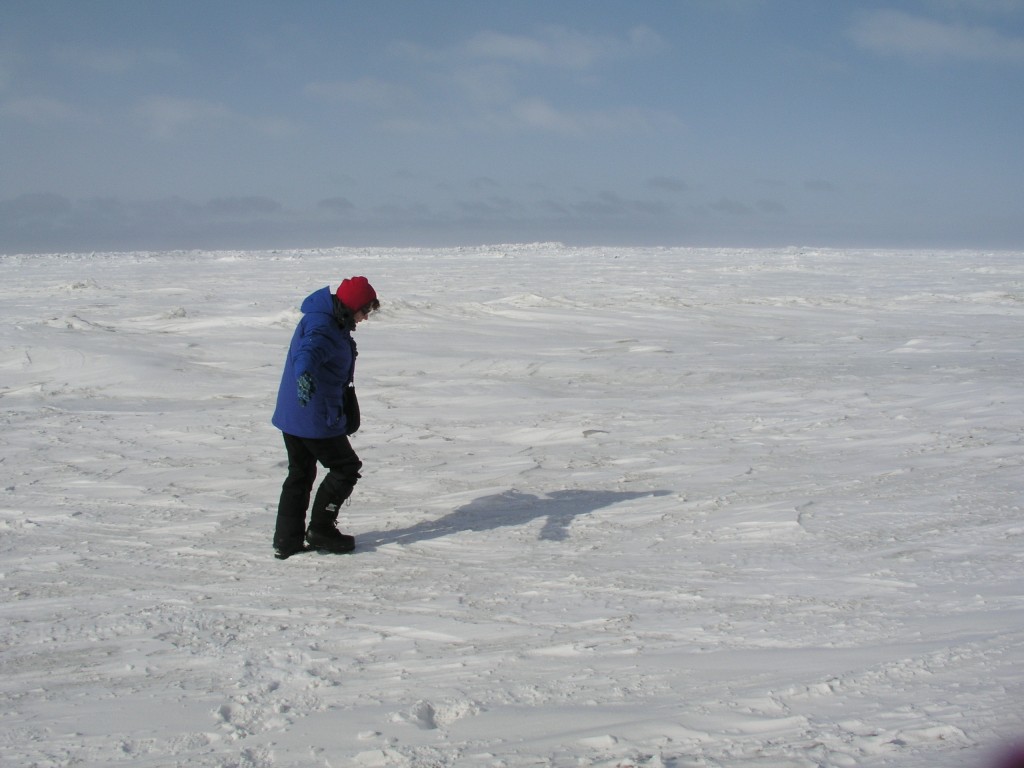




















Feedback